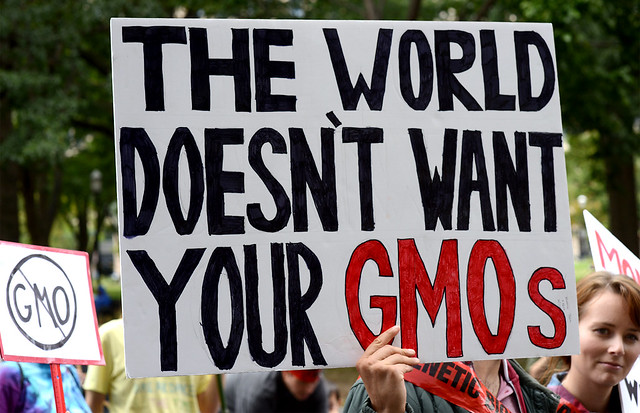 |
| March against Monsanto - Washington, USA. Photo by Stephen Melkisethian on Flickr |
Even in the face of consumer rejection, Monsanto has refused to change the course of its GM business. Instead, the Company's tactic has been to make sure it can control government policy on GMOs. To do this, all that's needed is to control the experts who advise the government on risk assessment.
“Regulatory policy is increasingly made with the participation of experts, especially academics. A regulated firm or industry should be prepared whenever possible to co-opt these experts. This is most effectively done by identifying the leading experts in each relevant field and hiring them as consultants and advisors, or giving them research grants and the like. This activity requires a modicum of finesse; it must not be too blatant, for the experts themselves must not recognize that they have lost their objectivity and freedom of action. At a minimum, a program of this kind reduces the threat that the leading experts will be available to testify or write against the interests of the regulated firms.” (from 'The Regulation Game: Strategic Use of the Administrative Process' by Bruce M Owen and Ronald Braeutigam)
OUR COMMENT
This cynical description of how to manipulate top scientists in order to use them to manipulate regulators seems too close to what the anti-GM movement has suspected of the biotech industry all along to be a coincidence.
Interestingly, the quotation comes from a book published in 1978, long before GM food had seen the light of day. The biotech industry has had plenty of time to groom its pet 'experts'.
After reading this, it's worth revisiting the UN Report, 'Wake up before it's too late' (See UN SAYS WAKE UP BEFORE IT'S TOO LATE, October 2013), especially Nabhan's take on the situation.
Then tell Westminster to wake up to the danger that its 'experts' on GM risk assessment might 'not recognize that they have lost their objectivity and freedom of action'.
No comments:
Post a Comment
Thanks for your comment. All comments are moderated before they are published.